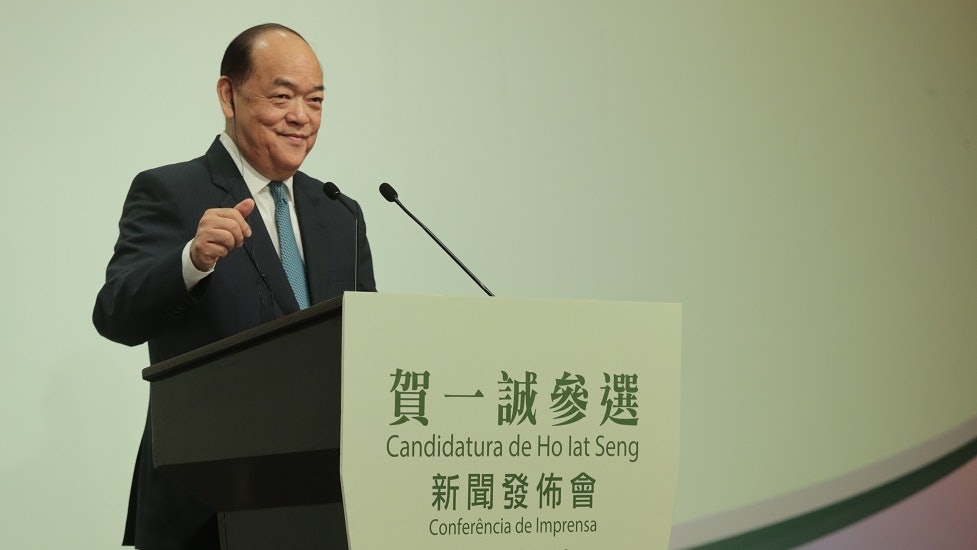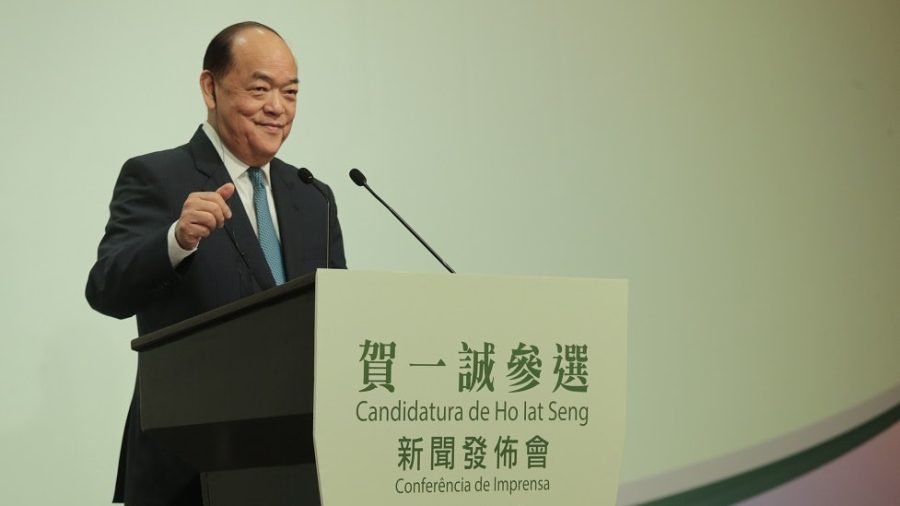Legislative Assembly (AL) President Ho Iat Seng formally announced his bid for chief executive yesterday, in “a strong desire and sense of mission” to serve the nation, and Macau and its residents.
Ho, an entrepreneur and indirectly-elected lawmaker representing the city’s business sector, made the announcement during a press conference at Macau Tower which was organised by his campaign office. Dozens of media workers from Macau, Hong Kong and the mainland attended the press conference.
Ho, 62, made a speech about his formal decision to run for the city’s top job first before answering media questions during yesterday’s press conference which lasted for about 90 minutes.
‘Great courage & wisdom’
In his election bid speech, Ho pledged that he – if elected – will listen to the views of residents from various segments of civil society and resolve various difficulties in Macau’s development “with great courage and wisdom”
Ho insisted that he could not elaborate on his campaign platform during yesterday’s press conference as the chief executive candidacy nomination process has still not begun.
Ho also emphasised that he – if elected – will not only place special emphasis on Macau’s participation in the development of the Guangdong-Hong Kong-Macau Greater Bay Area (GBA) but also on various issues concerning the life of the population.
Ho’s intention to run for the special administrative region’s highest post initially emerged earlier this year when he told reporters on February 13 that he was “actively and prudently” considering running for chief executive. Ho announced on April 18 that he had “provisionally” decided to run in the chief executive election. The Standing Committee of the National People’s Congress (NPC) in Beijing passed a decision on April 23 to approve Ho’s request to resign from the nation’s top legislature, which cleared the way for his bid for the chief executive post.
Quitting legislature
Ho said that he would resign from the Legislative Assembly so that he will carry out his election campaign without keeping his seat in the legislature’s hemicycle.
Ho noted that according to the Chief Executive Election Law, lawmakers are not barred from running for chief executive, while their seats are merely suspended after officially having been accepted as a chief executive candidate.
Ho said: “I am not a person who procrastinates. Therefore I now clearly tell everyone that I will resign as a lawmaker and the legislature’s president and will not keep the position as a lawmaker when carrying out my election campaign.”
Ho added: “After today, I will immediately engage in the legal procedures for resigning as a lawmaker and the legislature’s president.”
According to the Chief Executive Election Law, a candidate must obtain at least 66 nominations from among the 400-member Chief Executive Election Committee. After a nominee submits the nominations that he or she has obtained, the Chief Executive Electoral Affairs Commission will then assess whether the nominee can be formally accepted as a chief executive candidate. A lawmaker will have his or her seat suspended if they are officially accepted as a chief executive candidate until the day the election outcome is announced. If a lawmaker is elected as chief executive, he or she will be disqualified from being a lawmaker.
However, Ho chose to give up his seat in the legislature.
‘Strong desire, deep affection’
In his election bid speech, Ho said, “With my most sincere concern and my sense of responsibility for Macau’s development, and with my strong desire and sense of mission to serve my country, to serve Macau and its residents, I have formally decided to run for the fifth term of chief executive of the Macau Special Administrative Region (MSAR).”
Ho said, “I have a deep affection for Macau. Born, educated, working and living in Macau, I have gone through various stages of my life and witnessed the evolution and changes of Macau over the years.”
Ho, a widely respected community leader, was elected as an NPC deputy from Macau in 2000 and was then elected as an NPC Standing Committee member in 2001. He had been an NPC Standing Committee member ever since – the only one from Macau – until April 23 when his resignation request was approved by the NPC Standing Committee.
Ho, born in Macau in June 1957, was first elected as an indirectly-elected legislator representing the city’s business sector in 2009 and served as the vice-president of the legislature in 2009-2013. He was re-elected as an indirectly-elected lawmaker in 2013 and was elected by his peers in the legislative hemicycle as speaker of the legislature for the 2013-2017 term. He was re-elected as an indirectly-elected lawmaker and re-elected as the legislature’s president in 2017. Ho was a member of the Executive Council – the local government’s top advisory body – from 2004 to 2009.
In his speech yesterday, Ho said, “Having worked in the highest organ of state power [NPC] for so many years, I have developed a profound understanding of the national development. Serving in both the Executive Council and Legislative Assembly, I have had more comprehensive contact with Macau society and got a real understanding of the difficulties Macau residents have been facing in traffic, housing, medical care and daily life.”
‘Listening to people’
Ho stressed, “I understand that Macau residents have a higher expectation for their career development, good governance, fairness and justice and quality of life. What I have learnt in my work over the years is that we need to be good at listening to people’s views and pooling their wisdom, and we need to properly address the diverse demands by civil society, balance the interests of all parties, and apply the rule of law’s thinking and approach to governance”.
Ho pledged that he – if elected – will build a clean and efficient government and a prosperous and diversified economy.
Healthy development in gaming sector
When asked about his plan for the number of gaming permits to be granted after the current three gaming concessions and three sub-concessions expire in 2022, Ho noted that the gaming sector as Macau’s leading industry is an important source for the government’s tax revenues and the main pillar of the local economy. Ho said that the gaming industry has, however, hampered the development of local small- and medium-sized enterprises (SMEs) due to the leading sector’s advantage in its large use of human and land resources.
Ho said the “sole” direction for Macau’s gaming sector was that it should be developed in a healthy manner. Ho also said that for the time being he could not comment on the possible number of gaming permits to be granted in the future as the matter would depend on the possible future amendments to the law regulating the city’s gaming industry.
Clean governance
When asked how he plans to achieve his objective of building a clean government – as mentioned in his election bid speech, Ho said that Macau should have a clean government, adding that this was an unquestionable issue that the government could not evade tackling. Ho was quick to add that it was not suitable for him to elaborate on his plans for clean governance as the purpose of yesterday’s press conference was to merely announce his formal decision to run for chief executive.
Many observers had expected Ho to reveal at least a brief outline of his campaign platform yesterday.
Changes to public admin system
When asked how he planned to achieve the concept of “change and innovation” as mentioned in his election bid speech, Ho said that “change and innovation is the current trend in the world but “we should not carry out change merely for the sake of change.”
Ho insisted that many problems affecting Macau should be solved by tackling their fundamental causes. Ho said the fundamental causes included problems in the city’s public administration system. Ho went on to say that Macau’s public administration system originates from the one in Portugal and that it has remained unchanged for 30 years, adding that consequently the city’s public administration system was “worth reviewing” for possible change.
Ho said that he hoped to solve the various problems in the public administration that have been criticised by civil society by tackling their fundamental causes. Ho said that such problems included the situation in which it was better to know someone working in the public administration than to be qualified for a particular position when it comes to seeking such a position.
‘Painful process’
Ho said that a major change to the public administration system may involve a painful process. “When we change for good, we hope to get residents’ support. We should not carry out change merely for the sake of change, and we should not do nothing just for the purpose of not changing anything, which would be nonfeasance. Frankly speaking, if I were to do nothing, I would rather not run for chief executive. My announcement of going ahead with the election bid means that I am determined to do something [carry out administrative reforms],” Ho said.
When asked if he plans to push forward political reform, Ho said that the current election systems for chief executive and the legislature have been operating for many years, adding that he would need to listen to opinions from civil society about any possible changes to the political system. Ho said that the political reform issue was within the right of the central government and that possible political reforms would involve a lot of work.
GBA opportunity
When asked why he had now decided to run for chief executive when he had previously said he would not run, Ho said that before he did not want to change his posts as the local legislature’s president and an NPC Standing Committee member as he had already been familiar with his NPC tasks. He said that “many friends hope that I will run for chief executive due to the [central government’s] Greater Bay Area initiative.”
Ho said that “many of his friends” believe that he can help integrate Macau into the GBA by making good use of his experience in legislative work in both Beijing and Macau. Ho said that if Macau missed the GBA development opportunity, the city would possibly be “marginalised”. Ho admitted that leading Macau residents, including young people, into the GBA would not be an easy task.
Responding to a reporter’s question, Ho denied the claim that he had been chosen by the central government for Macau’s top post and reaffirmed that it was “local friends” who had told him they hoped that he would run for chief executive. Ho said that when it comes to support from the central government for him to run for chief executive, it was the fact that the NPC Standing Committee unanimously approved his resignation request.
Support team
During yesterday’s press conference, Ho introduced key members of his campaign office, which was set up yesterday, to the media. Appointed lawmaker-cum-law associate professor Iau Teng Pio is the representative for his campaign office, while Macau Industrial Association Chairman Antonio Chui Yuk Lum is the director of the office and former lawmaker-cum-unionist Lam Heong Sang is the vice director. Lam, a vice-chairman of the Macau Federation of Trade Unions (Gung Luen), was the vice-president of the legislature for the 2013-2017 term.
Ho noted that members of his campaign team are from various segments of civil society, such as the educational, professional, financial and commercial segments as well as the grassroots.






